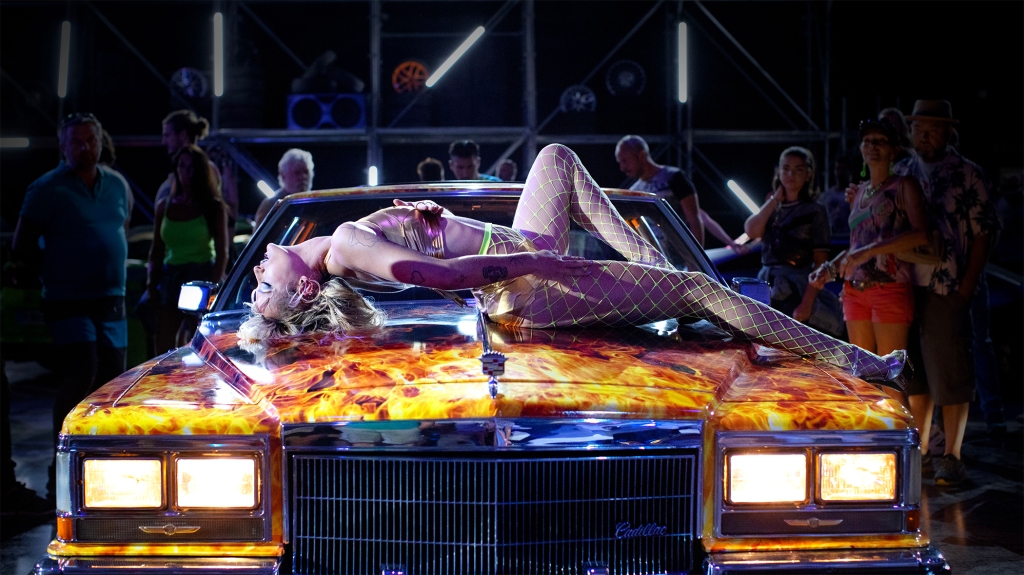By now many have heard of, if not seen, Titane, writer/director Julie Ducournau’s follow-up to her veterinary school coming-of-age horror Raw. Titane has already walked off with the Palme d’Or at Cannes and is a favorite to receive at least Best International Feature at the Academy Awards. It’s also one of the oddest horror films to come along for some time, focusing on a young woman who has a rather intense relationship with cars. Among other things.
Titane opens with a young girl, Alexia (Adèle Guigue), making car noises in the backseat, much to the annoyance of her father (Bertrand Bonello). His anger leads to a crash and a long recuperation and eventual titanium plate implanted in the girl’s head. Several years later, Alexia is an adult (played by the remarkable Agathe Rouselle, in her film debut) who makes her living as a car model, dancing and gyrating on vehicles at trade shows. But a series of bizarre events sends Alexia’s life spiralling off in a new direction as she discovers she’s pregnant and hides out by posing as the long-lost son of firefighter Vincent (Vincent Lindon), with whom she begins to develop a tenuous and unlikely bond.
Trying to describe the plot of Titane must begin to spoil it. By now most viewers are probably aware of the crux at its center when Alexia gets pregnant after she has sex with a Cadillac. But if the film began and ended with that element—literal, ahem, auto-eroticism—it would not be the tour de force that it truly is. Ducournau manages to take the most bizarre element of her story and shift the focus almost immediately, as Alexia goes on the run, concealing her pregnancy and entering Vincent’s life.

It’s difficult to parse why exactly Titane works, given the odd subject matter, at times unsympathetic characters, and even odder twists and turns. Ducournau pushes the viewer to accept the events and the characters by establishing a strong aesthetic that echoes, in places, Claire Denis’s Beau Travail, as she dives into the depths of a queer, feminist Freudianism. Cars, sex, and violence come together in a series of dreamlike images designed to be uncomfortable, to question the viewer’s accepted understanding of sexuality and even gender. The relationship between the female body and cars has long been a feature of Western culture, from the pin-up calendars of sexy women straddling hoods, to the appearances of models and dancers at car shows. As Alexia and her fellow models gyrate on top of cars, circled and photographed by panting men, is it really such a far stretch to imagine literal sex with a car? At one point, a man attempts to touch a model only to be seized by a bouncer with the words “touch with your eyes.” It doesn’t get more explicit than that.
That element of the gaze is here taken over and subverted—Alexia’s sexuality is more a relationship with vehicles than with people, her fixation on cars and metal interrupting her relationships with other human beings, often to violent results. When she embeds herself in Vincent’s life, she binds her breasts and belly and shears off her hair to transform herself into Adrien, a transformation of the cisgender female body from an object of heteronormative male desire or motherhood. In becoming Adrien, Alexia moves towards becoming more her true self, and her violence with other human beings recedes as she transforms.
Alexia’s entrance into a hyper-masculine culture as a man makes her gender more mutable and fluid—she doesn’t perform masculinity, particularly, but engages with a male-dominated world from a new perspective. No longer the object of binary desires, she becomes more herself, and begins to tentatively accept affection and understanding from other human beings as they come into contact with her.
Much of Titane is about performance vs. reality, of sexuality, of gender, and binary masculine/feminine roles, complicated by a woman whose sexuality and gender becomes increasingly fluid over the course of the film. Vincent declares that Alexia is his son, no matter what, even as her pregnancy becomes more prominent. Alexia refuses to talk for much of her time with Vincent, presumably because her voice will give her away, but her silence enables them to engage far more meaningfully with each other than if they spoke. The dancing Alexia does with the cars ceases to be for either the male gaze, or for her own erotic fixation—she dances with Vincent and with the other (male) firefighters as a celebration of connection, and her gender and sexuality gradually cease to matter.
Titane is a rare kind of film, a waking dream that makes perfect sense while you’re experiencing it, but that upon waking makes you go, “Well, that was odd.” Ducournau already made a name for herself with Raw, and Titane is very much in the same mold: an examination of sexuality and gender outside the cisgender and heteronormative, challenging to the viewer while maintaining a coherent logic and even wry humor.
Titane is currently in theaters and available on VOD.


